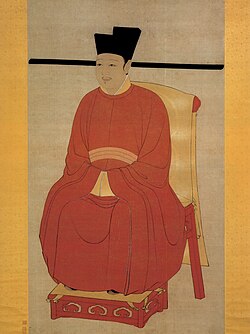Emperor Huizong of Song
| Emperor Huizong of Song |
|||||||||||||
|---|---|---|---|---|---|---|---|---|---|---|---|---|---|
 |
|||||||||||||
| Emperor of the Song dynasty | |||||||||||||
| Reign | 23 February 1100 – 18 January 1126 | ||||||||||||
| Predecessor | Emperor Zhezong | ||||||||||||
| Successor | Emperor Qinzong | ||||||||||||
| Born | Zhao Ji 7 June 1082 |
||||||||||||
| Died | 4 June 1135 (aged 52) | ||||||||||||
| Empresses |
Empress Xiangong Empress Xiansu Empress Mingda Empress Mingjie Empress Xianren |
||||||||||||
| Concubines | 143 concubines | ||||||||||||
| Issue | 38 sons and 34 daughters | ||||||||||||
|
|||||||||||||
| House | House of Zhao | ||||||||||||
| Father | Emperor Shenzong | ||||||||||||
| Mother | Empress Qinci | ||||||||||||
| Era dates | |
|---|---|
| Jianzhongjingguo (建中靖國; 1101) Chongning (崇寧; 1102–1106) Daguan (大觀; 1107–1110) Zhenghe (政和; 1111 – October 1118) Chonghe (重和; November 1118 – February 1119) Xuanhe (宣和; February 1119 – 1125) |
|
| Posthumous name | |
| Tishen Hedao Junlie Xungong Shengwen Rende Xianci Xianxiao Huangdi (體神合道駿烈遜功聖文仁德憲慈顯孝皇帝) (awarded in 1143) |
|
| Temple name | |
| Huizong (徽宗) |
| Emperor Huizong of Song | |||||||
| Chinese | 宋徽宗 | ||||||
|---|---|---|---|---|---|---|---|
| Literal meaning | "Emblemed Ancestor of the Song" | ||||||
|
|||||||
| Zhao Ji | |||||||
| Traditional Chinese | 趙佶 | ||||||
| Simplified Chinese | 赵佶 | ||||||
|
|||||||
| Duke Hunde | |||||||
| Chinese | 昏德公 | ||||||
| Literal meaning | Besotted Duke | ||||||
|
|||||||
| Transcriptions | |
|---|---|
| Standard Mandarin | |
| Hanyu Pinyin | Sòng Huīzōng |
| Transcriptions | |
|---|---|
| Standard Mandarin | |
| Hanyu Pinyin | Zhào Jí |
| Transcriptions | |
|---|---|
| Standard Mandarin | |
| Hanyu Pinyin | Hūndé Gōng |
Emperor Huizong of Song (7 June 1082 – 4 June 1135), personal name Zhao Ji, was the eighth emperor of the Song dynasty in China. Born as the 11th son of Emperor Shenzong, he ascended the throne in 1100 upon the death of his elder brother and predecessor, Emperor Zhezong, because Emperor Zhezong's only son died prematurely. He lived in luxury, sophistication and art in the first half of his life. In 1126, when the Jurchen-led Jin dynasty invaded the Song dynasty during the Jin–Song Wars, Emperor Huizong abdicated and passed on his throne to his eldest son, Emperor Qinzong, while he assumed the honorary title of Taishang Huang (or "Retired Emperor"). The following year, the Song capital, Bianjing, was conquered by Jin forces in an event historically known as the Jingkang Incident. Emperor Huizong, along with Emperor Qinzong and the rest of their family, were taken captive by the Jurchens and brought back to the Jin capital, Huining Prefecture in 1128. The Jurchen ruler, Emperor Taizong, gave the former Emperor Huizong a title, Duke Hunde (literally "Besotted Duke"), to humiliate him. Emperor Huizong died in Wuguocheng after spending about nine years in captivity.
Despite his incompetence in rulership, Emperor Huizong was known for his promotion of Taoism and talents in poetry, painting, calligraphy and music. He sponsored numerous artists at his imperial court, and the catalogue of his collection listed over 6,000 known paintings.
Emperor Huizong, besides his partaking in state affairs that favoured the reformist party that supported Wang Anshi's New Policies, was a cultured leader who spent much of his time admiring the arts. He was a collector of paintings, calligraphy, and antiques of previous dynasties, building huge collections of each for his amusement. He wrote poems of his own, was known as an avid painter, created his own calligraphy style, had interests in architecture and garden design, and even wrote treatises on medicine and Taoism. He assembled an entourage of painters that were first pre-screened in an examination to enter as official artists of the imperial court, and made reforms to court music. Like many learned men of his age, he was quite a polymath personality, and is even considered to be one of the greatest Chinese artists of all time. However, his reign would be forever scarred by the decisions made (by counsel he received) on handling foreign policy, as the end of his reign marked a period of disaster for the Song Empire.
...
Wikipedia
